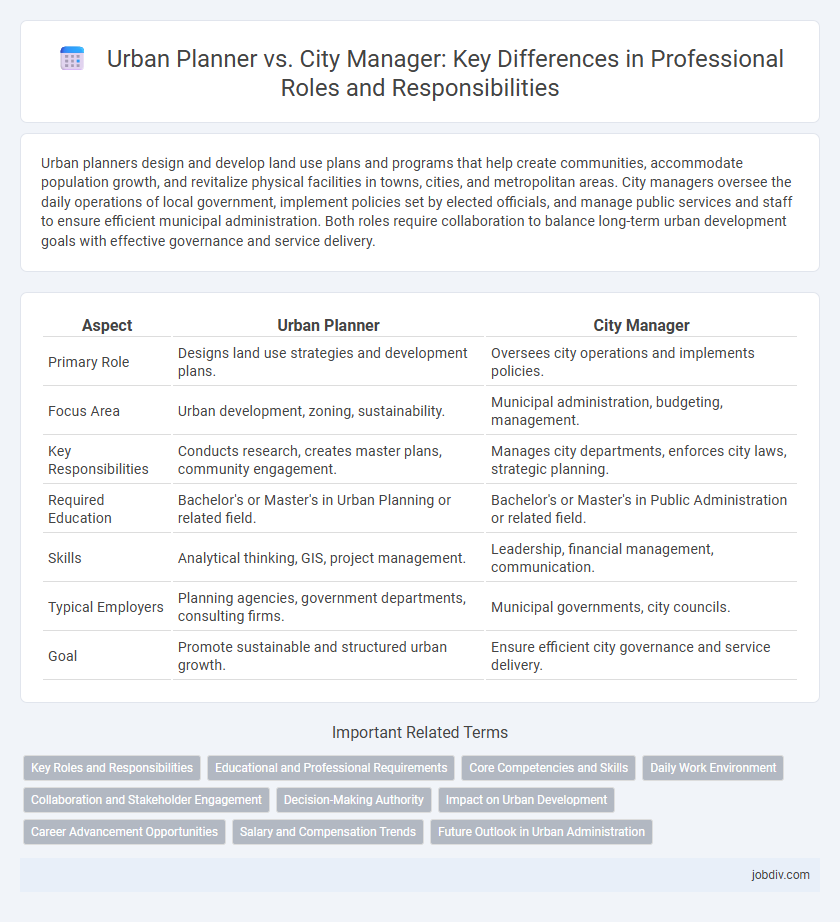Urban planners design and develop land use plans and programs that help create communities, accommodate population growth, and revitalize physical facilities in towns, cities, and metropolitan areas. City managers oversee the daily operations of local government, implement policies set by elected officials, and manage public services and staff to ensure efficient municipal administration. Both roles require collaboration to balance long-term urban development goals with effective governance and service delivery.
Table of Comparison
| Aspect | Urban Planner | City Manager |
|---|---|---|
| Primary Role | Designs land use strategies and development plans. | Oversees city operations and implements policies. |
| Focus Area | Urban development, zoning, sustainability. | Municipal administration, budgeting, management. |
| Key Responsibilities | Conducts research, creates master plans, community engagement. | Manages city departments, enforces city laws, strategic planning. |
| Required Education | Bachelor's or Master's in Urban Planning or related field. | Bachelor's or Master's in Public Administration or related field. |
| Skills | Analytical thinking, GIS, project management. | Leadership, financial management, communication. |
| Typical Employers | Planning agencies, government departments, consulting firms. | Municipal governments, city councils. |
| Goal | Promote sustainable and structured urban growth. | Ensure efficient city governance and service delivery. |
Key Roles and Responsibilities
Urban planners develop land use plans and programs that help create communities, accommodate population growth, and revitalize physical facilities in towns, cities, and metropolitan areas. City managers oversee the daily operations of municipal government, implementing policies set by the city council, managing budgets, and coordinating between departments to ensure efficient public service delivery. While urban planners focus on long-term community development and zoning, city managers concentrate on administrative leadership and operational management to achieve municipal goals.
Educational and Professional Requirements
Urban Planners typically require a bachelor's or master's degree in urban planning, geography, or a related field, often supplemented by certification from the American Institute of Certified Planners (AICP) to enhance professional credibility. City Managers usually hold a bachelor's or master's degree in public administration, public policy, or business administration, with many pursuing credentials from the International City/County Management Association (ICMA) for advanced career opportunities. Both roles demand strong analytical, leadership, and communication skills, but City Managers often need extensive experience in municipal government operations and fiscal management.
Core Competencies and Skills
Urban planners excel in spatial analysis, land use planning, and policy development, emphasizing design principles and environmental sustainability. City managers specialize in public administration, budgeting, and organizational leadership, ensuring efficient municipal operations and regulatory compliance. Both roles require strong communication, problem-solving, and stakeholder engagement skills to drive community development and urban growth.
Daily Work Environment
Urban Planners analyze land use, zoning regulations, and community development projects, collaborating with architects and engineers to design sustainable urban spaces. City Managers oversee municipal operations, manage city budgets, and coordinate with public departments to ensure efficient service delivery and policy implementation. Both roles require strong communication skills and adaptability in fast-paced government or consultancy environments focused on urban growth and management.
Collaboration and Stakeholder Engagement
Urban planners and city managers collaborate closely to balance long-term development goals with day-to-day administrative functions, ensuring sustainable and efficient urban growth. Urban planners engage stakeholders such as community members, developers, and public agencies to gather input and align projects with public needs and regulations. City managers facilitate this collaboration by coordinating between departments, managing resources, and implementing policies that reflect stakeholder priorities and planning objectives.
Decision-Making Authority
Urban Planners develop strategic land use plans and zoning regulations that shape long-term urban development, providing recommendations based on data analysis and community needs. City Managers hold executive decision-making authority, implementing policies, managing municipal operations, and allocating resources to ensure efficient city governance. The distinction lies in Urban Planners advising on planning initiatives, while City Managers make final administrative and operational decisions.
Impact on Urban Development
Urban planners shape urban development by designing land use plans, zoning regulations, and community layouts that guide sustainable growth and optimize resource use. City managers implement these plans by managing public services, budgeting, and coordinating departments to ensure efficient infrastructure development and maintenance. Their collaborative efforts directly influence economic vitality, environmental sustainability, and quality of life in urban areas.
Career Advancement Opportunities
Urban planners typically advance by gaining expertise in zoning laws, environmental regulations, and community engagement, often moving into senior planning roles or specialized consultancy positions. City managers, possessing broad administrative skills and overseeing municipal operations, progress by demonstrating leadership in budgeting, policy implementation, and interdepartmental coordination, which can lead to executive roles such as county administrator or regional government director. Both careers benefit from certifications like AICP for urban planners and ICMA membership for city managers, enhancing their professional credibility and opening doors to higher-level management opportunities.
Salary and Compensation Trends
Urban planners typically earn a median salary of $76,000 annually, with variations based on experience and geographic location, while city managers command higher compensation, averaging $120,000 to $150,000 per year, reflecting their broader administrative responsibilities. Salary trends show urban planners experiencing steady growth tied to increased urban development projects, whereas city managers benefit from competitive packages that often include bonuses and comprehensive benefits due to their executive roles. Regional demand and governmental budget allocations significantly influence compensation structures for both professions.
Future Outlook in Urban Administration
Urban planners are projected to experience a growth rate of 7% from 2022 to 2032, driven by increasing urbanization and sustainability initiatives, while city managers face evolving responsibilities in governance, technology integration, and community engagement as smart city frameworks become more prevalent. The demand for urban planners specializing in data analytics, environmental planning, and housing development is rising to address complex urban challenges. City managers must adapt to innovative policy-making and infrastructure management tools to optimize urban administration and enhance public services effectively.
Urban Planner vs City Manager Infographic

 jobdiv.com
jobdiv.com